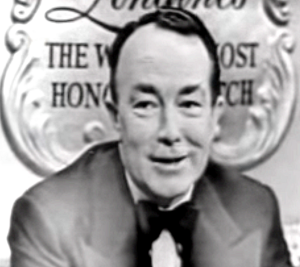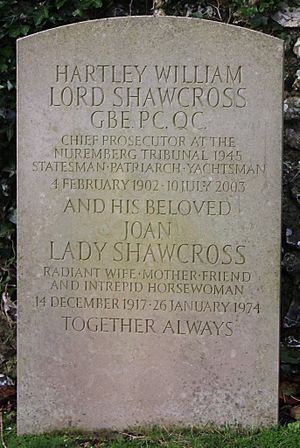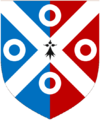Hartley Shawcross facts for kids
Quick facts for kids
The Lord Shawcross
|
|
|---|---|

Shawcross being interviewed in 1954
|
|
| President of the Board of Trade | |
| In office 24 April 1951 – 26 October 1951 |
|
| Prime Minister | Clement Attlee |
| Preceded by | Harold Wilson |
| Succeeded by | Peter Thorneycroft |
| Attorney-General for England | |
| In office 4 August 1945 – 24 April 1951 |
|
| Prime Minister | Clement Attlee |
| Preceded by | Sir David Maxwell Fyfe |
| Succeeded by | Sir Frank Soskice |
| Member of Parliament for St Helens |
|
| In office 5 July 1945 – May 1958 |
|
| Preceded by | William Albert Robinson |
| Succeeded by | Leslie Spriggs |
| Member of the House of Lords Lord Temporal |
|
| In office 14 February 1959 – 10 July 2003 Life peerage |
|
| Personal details | |
| Born |
Hartley William Shawcross
4 February 1902 Giessen, Grand Duchy of Hesse, German Empire |
| Died | 10 July 2003 (aged 101) Cowbeech, East Sussex, England |
| Nationality | British |
| Political party | Labour (before 1959) |
| Other political affiliations |
Crossbencher (1959–2003) |
| Spouses |
Alberta Rosita Shyvers
(m. 1924; died 1943)Joan Winifred Mather
(m. 1944; died 1974)Susanne Monique Huiskamp
(m. 1997) |
| Children | 3 (by Mather; including William) |
| Education | Dulwich College |
| Alma mater | |
| Awards | Knight Bachelor (1945) |
Hartley William Shawcross, Baron Shawcross (born 4 February 1902 – died 10 July 2003) was an important British lawyer and politician. He was known as Sir Hartley Shawcross from 1945 to 1959.
Shawcross played a key role as the lead British prosecutor at the Nuremberg trials, where major figures from Nazi Germany were tried for war crimes. He also served as Britain's main representative to the United Nations right after World War II. Later, he became the Attorney General for England and Wales, which is the chief legal advisor to the government.
Contents
Early Life and Education
Hartley William Shawcross was born in Giessen, Germany. His parents, John and Hilda Shawcross, were British. At the time, his father was teaching English at Giessen University. Hartley also had a younger brother, Christopher, who became a lawyer and politician too.
Hartley went to Dulwich College for his schooling. He then studied at the London School of Economics and the University of Geneva. He trained to become a lawyer at Gray's Inn, where he achieved excellent results.
A Career in Law and Politics
As a young lawyer, Shawcross worked on important cases. For example, he was part of the legal team for the coal mine owners during an investigation into the Gresford disaster in 1934. This was a terrible mining accident.
He joined the Labour Party and became a Member of Parliament (MP) for St Helens from 1945 to 1958. In 1945, he was appointed Attorney General for England and Wales, a position he held until 1951. He was also given the title of Knight Bachelor in 1945.
The Nuremberg Trials
One of Shawcross's most famous roles was as the Chief Prosecutor for the United Kingdom at the Nuremberg Trials. These trials were held after World War II to bring justice to those responsible for terrible crimes committed by the Nazis.
Shawcross's speeches at Nuremberg were very powerful. He famously said, "There comes a point when a man must refuse to answer to his leader if he is also to answer to his own conscience." This meant that people must follow their own moral compass, even if it means going against orders.
He wanted to show that the trials were not just about revenge. Instead, he focused on the rule of law. He argued that the Nazi leaders had broken international laws and agreements that Germany had agreed to before the war. He showed how the defendants were involved in the murder of millions of people.
Attorney General and United Nations Role
As Attorney General, Shawcross was involved in several high-profile legal cases in Britain. He prosecuted individuals accused of serious crimes, including those who gave atomic secrets to the Soviet Union.
From 1945 to 1949, he was Britain's main representative to the United Nations. He helped with the official adoption of the Flag of the United Nations in 1946.
In 1951, he briefly served as President of the Board of Trade. This happened after some government ministers resigned over disagreements about healthcare costs. Shawcross took over this role until the Labour government lost the election later that year.
Shawcross also gave his name to an important idea called the Shawcross principle. This principle states that the Attorney General should make decisions about criminal cases independently, without pressure from other government officials.
Leaving Parliament
Shawcross ended his career as a lawyer in 1951. He resigned from Parliament in 1958, saying he was tired of party politics.
Becoming a Lord
On 14 February 1959, Shawcross was made one of Britain's first life peers. This meant he became Baron Shawcross and could sit in the House of Lords. In the House of Lords, he was a crossbencher, meaning he didn't officially belong to any political party.
Supporting Press Freedom
Shawcross was a strong supporter of press freedom. In 1961, he led a special committee that looked into the British press. Later, in 1967, he became a director of The Times newspaper, helping to ensure its independence.
From 1974 to 1978, he was the chairman of the Press Council. This group helps to maintain high standards in journalism. He was known for speaking out against journalists who went too far and newspaper owners who profited from bad practices. He was a "doughty defender of press freedom," meaning he bravely stood up for it.
University Chancellor
From 1965 to 1985, Shawcross was the Chancellor of the University of Sussex. This is an important ceremonial role at a university.
Later Years and Awards
In 1974, Lord Shawcross received a high honor, being appointed a Knight Grand Cross of the Order of the British Empire (GBE).
He also held positions on the boards of several large companies, including EMI and Times Newspapers. He was also involved with the International Chamber of Commerce.
Helping Others
In 1957, Shawcross helped to start JUSTICE, an organization that works for human rights and law reform. He was its first chairman until 1972. He also played a big part in creating the University of Sussex and served as its chancellor for many years.
He was also the President of a charity called Attend (formerly the National Association of Leagues of Hospital Friends) from 1962 to 1972.
Personal Life
Lord Shawcross was married three times during his long life. His second wife, Joan Winifred Mather, sadly died in a horse riding accident in 1974. They had three children together, including the well-known author and historian William Shawcross.
At the age of 95, he married Susanne Monique in 1997.
Shawcross enjoyed sailing and was a member of prestigious yacht clubs. He even owned a racing yacht called Vanity V. It's said that around 1951, he had "Vote Labour" painted on the side of his yacht to support his political party!
Lord Shawcross passed away on 10 July 2003, at the age of 101, at his home in East Sussex. He is buried in the churchyard at Jevington.
Images for kids
 | Lonnie Johnson |
 | Granville Woods |
 | Lewis Howard Latimer |
 | James West |




